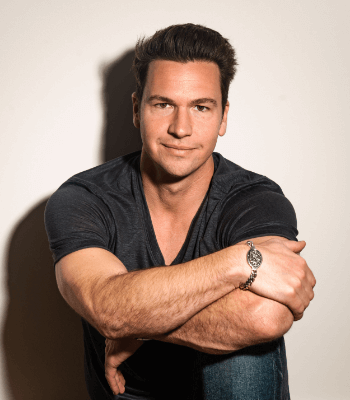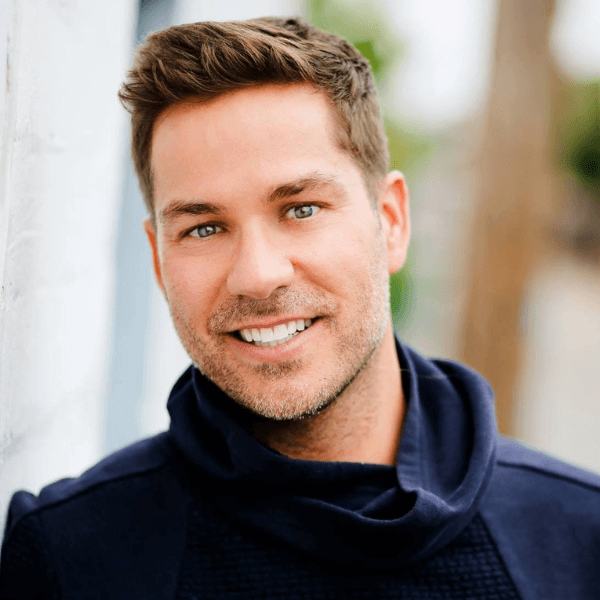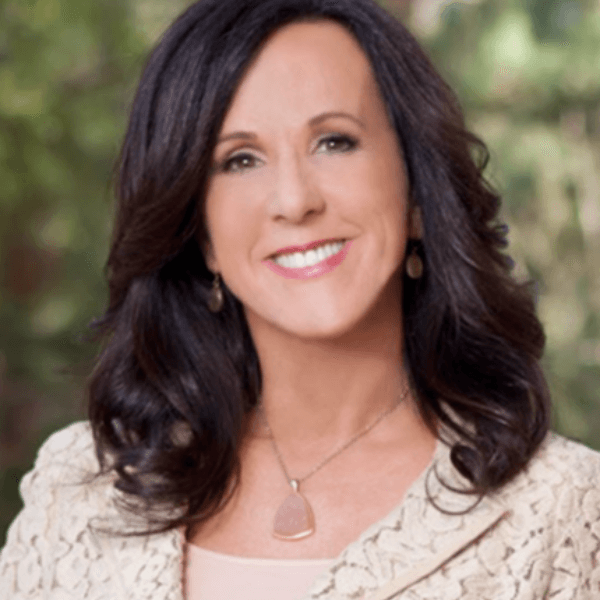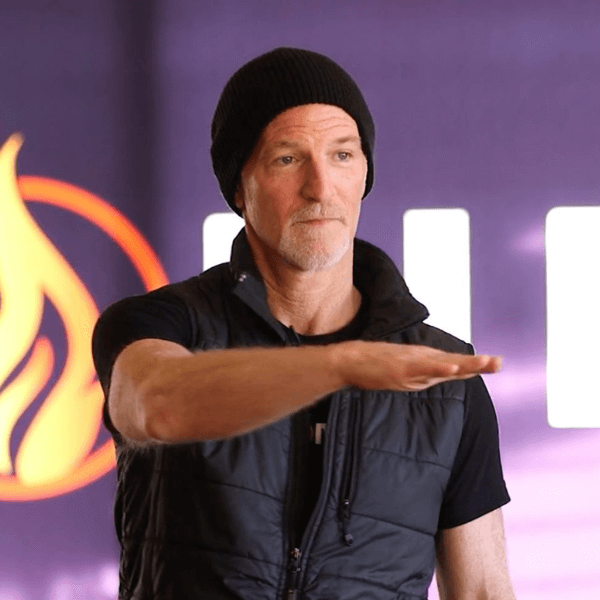The AME Magazine Podcast Interview: Good Enough

My One Man Show: Good Enough
Host: I have on the line with me a special guest. His name is Ted McGrath, and he is the star of a new movie called Good Enough. Now, Good Enough is a true and triumphant journey that Chronicles the life of a young man, who doesn’t believe in himself. Struck down by childhood shame and loss, he turns to drugs and alcohol. He searches for money and power to mask his wounds. And even though a destined chain of events and people are guiding him towards his purpose…He’s blinded by fear and arrogance. Good enough presents the age old question: Can people actually change? Welcome to the show, Ted. How are you doing today?
Ted: I’m doing great. How are you?
Host: Fantastic. So this is a real life story and obviously, it probably has some type of connection to you. Is this story about you?
Ted: Yes it is. It’s my life story and it’s actually a one-man theater show that I put together. And I play about 12 characters on stage.
Host: Wow.
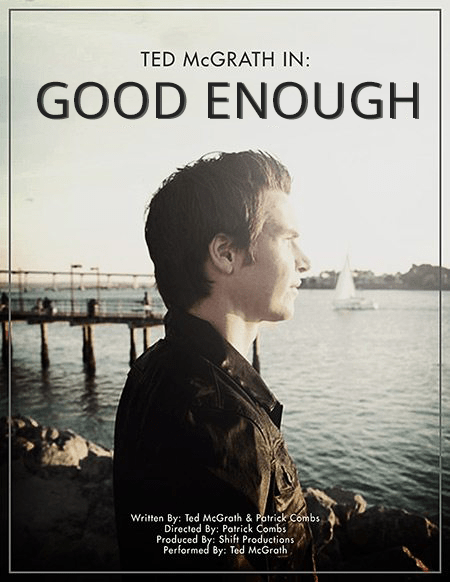
Ted: So, I spend about 71 minutes doing the show. It’s called Good Enough because it’s my journey in life, as you heard at the beginning, of not feeling good enough and having all these challenges getting in the way of me truly finding out who I am finding out my true purpose and dreams on this planet.
Host: So what made you stop believing in yourself at a young age? That’s usually when we really do believe in ourselves. You know, we believe that the world owes us stuff or we’re invincible or all these other types of scenarios that we run into. It’s not usually until later in life that we start doubting ourselves. So, what made you stop believing in yourself?
Ted: That’s a good question. If you watch the show you’ll get the whole answer but I’ll give you a sneak peek of it without giving it all away. In the early part of the show, and in my life story, my parents get divorced at six. Something happens there that is kind of radical, and I don’t want to give it away. But I start to feel like I’m not loved and I’m not good enough and everything then becomes about covering up the pain and feeling that if I achieve something somehow I’ll fill the void inside of me. So I go out and I became a little achiever at a young age. Then I have some things that happen. I have some sexual experiences with a girl who’s much older than me when I’m a young boy and even one with a young boy. So I’m really confused as a young kid around sex. I have this whole thing with my parents at a young age. And it’s kind of a heavy thing to happen, but we make it funny. So we make it light, we bring comedy about it, but it has a true message still in there. And then when I’m in the professional world at 21 years old, I’m like, “If I make money, I’ll get approval”. So I start with an insurance company called New York Life, and my first year my boss believed in me and said I was going to crack six figures. It wasn’t about the money, it was about the approval. So I put my head down and I cracked six figures. A year later, I overdosed on drugs and alcohol the night I cracked six figures and almost died. So, it’s this dim journey of what’s going to happen to me as a character, and there’s this whole journey of kind of redemption. But I keep sabotaging myself on my journey. So I take one step forward and then I take one step back. It’s a cool story because there are a lot of funny characters in there. A lot of big moments. There are moments where I got the opportunities to do things. Am I going to pull it off, am I going to blow it, am I going to sabotage my dreams? So ultimately, this whole journey is about will his purpose and dreams come true or will he just continue to screw up his life with drugs, alcohol, sex and feeling his not good enough. So that’s the story.
How I Handle Sharing My Emotional Story on the Stage
Without vulnerability, your message loses power. pic.twitter.com/T53yuPx3aN
— Ted McGrath (@ted_mcgrath) July 24, 2017
Host: So, let’s take a look at this… you’re doing your actual life on stage for everyone to see. That’s got to be kind of emotional, to begin with. Is this more therapy for you or is this more of like telling a story just to help change somebody else’s life from going down that track or is a little bit of everything? How do you get over the emotions of reliving your life and doing it in front of people? Also, what do you hope to accomplish by putting on this show?
Ted: This is a great question. Initially, in the beginning, I feel like telling the story for somebody, their life story. There’s an element of it. And then there was for me like I want to be heard. I want my story to be heard. The interesting thing that I went through is that I had the dream to do this one-man show because I wasn’t an actor before, 3 and a half years ago. And I always suppress that creative side even though I had it when I was a kid. I was more of the linear side, I always do financial stuff, I make money. So when I went to go tell my story, I have been going through a lot of different processing and things that help to just really get rid of the emotional charge around. You know, the things that happen as a kid, things with my family, and so for me as I started telling the story and before I told it, I had really deep conversations with my family, with my mom, with my dad, with my brother. So, so much of a resolve before I actually got up on stage and started telling the story, but, the story for me wasn’t a therapeutic journey as I got to telling it. The building up to telling it was the therapeutic journey. Once I started to getting up on stage, it was cool because I could get up there and share these things like rubbing my penis with another boy at nine years old and the things that so many people do. Whether that or something sexually weird. And people would come up saying, “Oh my god! Those things that you talked about, they happened to me too”. I heard stuff like that, in a different version, but it was funny because people keep these secrets that they think that they’re a really big deal. Some of the stuff just happens and it brings people to be able to communicate on it. Some people are telling, “Oh my god! I can’t believe you shared this”. I want to share this and it became a great show, it’s funny and entertaining, but it brought together a community of people that started sharing and just feeling more open to be able to transform their lives. Then of course there was stuff in there too that was very uplifting about finding your voice, finding out who you are and going after your dreams. So there’s cool stuff like that. So in the beginning, to answer your question, it was little bit therapeutic. As I launched the show, it was more of a transformational story to people, and that’s still what it is for me. It’s a way for me to experience my art and do what I love. Most importantly, have a show that has a real message and makes a real impact and is a lot of fun.
Host: You know, thinking about what you just were saying here, what’s pretty impactful is that I heard every day that people have had some pretty terrible things happen to them at a young age or as adults. They go on these crime sprees or they don’t manage their money well. They get into all these situations that bring them down in the ground. The first thing that they do is they blame their childhood – maybe where they lived, maybe the things that happened to them. They blame all that for their downfall. However, that can keep you down if you can’t mentally overcome it. But I don’t believe that’s what really keeps us down. I think what really keep us down are our choices. Having some things happen to you that shocked you when you were young and kind of brought you to this point. Now you’ve really overcome all that. What’s your take on something like that? Can we completely blame everything that has happened to us in our live that keep us from being successful in the future?
Ted: That’s a great point. I think we can’t blame anybody for it, I think we’re 100% the cause of our own lives and we make our choices that we take. So for me, the big journey and have people come to see the show is that there is a revelation in there like I created this. There are other people who are responsible for certain things but ultimately I am responsible for the meanings I give to things or how I go to my life after that. Whether I’m going to go after what I want in life or will I not. If I go after what I want then of course I am responsible for it. If I don’t, I am still responsible for it. That’s one of the beautiful things about the show; it has that positive message where people walk away taking responsibility. They don’t take away a message of blame and all, which is great. For me, it was just being able to go through such a journey in my life. You know today, I also have a business aside from my theater career. I have business called “Message to Millions“. I teach people how to take their life story and their message for their business, and then how to package that into their business in a way that will really represent who they are. Then I teach them incredible marketing strategies to get their message out to million people online across the world. I love what I do. I help people every day in my life. I have clients in over 80 different countries. I got a thriving business and I have a good relationship in life with my family members and with everybody in my life. I have a beautiful relationship with my girlfriend, which is the thing that I’ve always wanted in my life. Have a beautiful relationship with somebody that I care about and love, and I am going to marry. For me, I am standing there as a message of hope, not standing there as a message of perfection by any means. Standing there with a lot of the flaws that I have, you can look in my life now and go out. But here’s the truth of how I got here and what I went through.
RELATED: Good Enough: My Inspiration Behind The Show
Changing the Definition of Success
The only style I follow is my own personal style. #success pic.twitter.com/pXabP367mK
— Ted McGrath (@ted_mcgrath) July 24, 2017
Host: You know I got asked a question one time and I told people what I do and how much money I make and I don’t make a lot of money, I’m an artist. I’ve been an artist my entire life. They said, “How can you consider yourself successful if you don’t have a lot of money? You have to be really tight with your budget.” I was thinking to myself you know what, I got a wife, I got 3 dogs that I love, I have job that I love to do, I get to do what I love to do. Maybe it doesn’t bring a lot of money. But to me, that’s pretty successful for what I’ve been able to do. It made me sit back and think to myself, everybody has a different interpretation of what success is but, on the other hand, some people believe that it’s just strictly money and if you don’t have a lot of money at the end of the day, you’re not successful. What’s your take on something like that?
Ted: I think that is one of the worst insults to people. That getting there won’t make them happy. Because I’ve been there, I made a lot of money early in my 20s and also I make way more money now than I used to in my 20s. But I have the feel of doing the thing that I love and serving people and making difference in people’s lives. The fact that I get paid well to do that is a great bonus and I love it. And I don’t think that money is a yardstick for success. I think that if people truly love what they do, which is why I value artists so much in the world including myself being an artist, because I feel like our creative expressions lights up the world. You can have a moment with an artist, some things may say or communicate or express or show what they do or film what they do or whatever they put out there in the world. That’s the stuff that inspires people and lights up the world. I feel like we need more of that. Somebody who’s doing what he loves and happy that he’s impacting people’s lives.
Learning How to Not Take Criticism Personally

Host: As an artist, one of the scariest things that I have ever had to do in my life was go do a show. A lot of what I do is telling stories, but sometimes the stories look like they’re something but they really mean something else. Sometimes I put a lot of spiritual stuff into what I do, and when I went out to the show for the first time. I completely made myself vulnerable obviously. I’m there and I’m going to listen to people tear me apart and build me up at the same time. Sometimes, it’s hard to deal with the first part – when people tear you down and attack you and they judge you. Your art is an expression of you so sometimes we take that personally. So, coming from a situation where you’re a businessman and now you’re acting in your own play. Obviously, you’re playing a lot of characters and you’re telling your story about yourself. You’re really probably one of the most vulnerable people in the artist field right now because you’re telling a story that’s really sensitive. How did you prepare for someone saying, “That is the craziest thing I’ve ever heard”. “This guy’s nuts.” or building you up on the other end. How did you mentally prepare for that?
Ted: That’s a good question man. First off, when I saw a guy do a one-man show 3 and half years ago, I knew I was kid that has a talent to go do it. But I didn’t believe in myself. And it wasn’t even in my realm; I didn’t live in the world where people act. I was a kid from New Jersey. When I came out to San Diego, I had this dream to come to Los Angeles. I saw somebody do a one-man show. I was so inspired because I’ve been to Broadway and I’ve seen people do a play. This guy was doing a one-man show and I was so damn inspired by it, I was like, “I am going to do that”. For me, I was disillusioned maybe by my own art, I just wanted to go do it and I tried it. I went out because I have an audience of people in my seminar. I went out my first time in front of a hundred people without any coaching or anything, I just want to try something like that. The first time ever I was like a fish flopping around underwater, it was ugly as hell and it was so funny because I felt like, “Wow, that felt good. That was fun.” And I think that was part of the way I didn’t realized how bad I went for a while. But I did run into some people. One guy I ran into recently, 3 years later, I met this guy like a month ago, “I came to the very first versions of one of your show…” He really gave a very negative comment about it. I took it in, I go, “You know, you should come check out the new version. Because I really worked hard at this and this is my art and I love it.” It was a cool thing because I didn’t get upset with the guy. When somebody makes a negative comment that you could tell as a little bit distasteful, they’re the one to feel bad about it afterwards. So I told him, “Wow, I want you to come see the new show. If you want to come, check it out.” With the negative things we get, I do my best to just stay close to my truth and go, “What is my truth?” It’s been cool because I pulled in some really amazing people. One of my friends, a dear friend of mine, his name is James Barber. He is the phantom in the Phantom of the Opera on Broadway. He reached out to me because he saw what I do with my message and my business in helping the people get the message to help. We connected and we have developed an amazing friendship over the last year. He’s been so gracious to introduce me to great people, it’s great when you have somebody like him who clearly sees my work as a beginning even though this is nowhere to the standard of what he does. He believes in me as a person and he supports of it. It’s nice to have friends and good people that support you.
Host: People have to understand the constitution it takes for people as artists when they put out any type of work. The ones with the weaker constitutions, they get one or two really bad criticisms and they give it all up. Then you have the “woulda, coulda, shoulda and what if’s”. That’s probably one of the biggest failures you can have: the regrets. It’s people like you that took the bad and try to change for a good. You’re making something of yourself and still doing something that you love and you’re not letting it distract you. There are people that absolutely love Rembrandt and there are people that can’t stand them. People that are in these art forms, they’ve got to realize that you’re never going to be able to please everybody so all you gotta do is just please yourself, and everything else will fall into place.
Ted: Yes. Well said man. I love it.
Host: I’ll tell everybody, this is very embarrassing. I was at one of my shows and the guy took off, we became friends. He was a complete backstabber. A guy sent me an email because he asked this guy if there’s anybody that could help him do some photography work for his book. He said, “I wouldn’t have him do anything for me because of the fact that his artwork is no better than a 1 year old. A one year old could do better with their feet.” That’s pretty harsh man. I think what hurt the most about that was that I considered him a friend. He was talking me up on how he likes my stuff and then hit me behind the back with somebody else. These are the things you just deal with. Anybody that gets into it has got to expect that but also take the negative and turn it into positive.
Ted: Totally. Well, what’s your show?
Host: It was a photographic art show. I was doing stuff that has a dark side to it. You can create some amazing things that show people. But every piece that I put out there has a dark picture but the story behind it is amazing. One of my friends have committed suicide back in 2006 and I had these “woulda, shoulda, coulda” atmosphere. I completely gave up. I was a terrible friend; I should have been able to stop this. I had this vision at the top of my head, like somebody lying on the tombstone and the spirit of that person is comforting by putting the hand on the shoulder. This is death, this is terrible thing. I can’t even believe that you put this picture out there. This is my dream. I said, “You know what, how could you be dead and alive at the same time? You can’t.” The spirit is a symbol of the past; the past is healthy and happy. You have that and nothing could ever take it from you. But if you continue to sit there and take your future and try to mourn over the past, you’re not going to get anywhere in life. Therefore if you look back and you look past the sadness and you look at all the things that you’ve done and all the things that you’ve accomplished, your dreams and memories, they’re happy and you can take that into the future. And that’s the lesson I’ve learned from my friend passing away. I couldn’t change anything but I have the memories of him as we’re growing up and doing the things that we did together. That keeps me going for a better future. But they didn’t realize that when they saw the picture and they were quick to judge. That’s what I like to do sometimes. I like to create to the conversation.
Ted: I love it, man. I think that’s awesome.
Where to See Ted McGrath’s One Man Show

Host: So, obviously I heard that your show is debuting here in the next couple of weeks. Actually, I think it’s on the 12th of this month. Tell everybody where they could see it. And how could they find you more about you and see some of the shows that you have to put up.
Ted: Yeah. So the show is on the 13th at 7:30pm. You can go to tedmcgrathbrands.com, you’ll see on the homepage information about Good Enough. You can just click on there and then it’ll take you to a place with the information and the address here in Los Angeles. You can go to the website and check it out. You can come and join us.
Host: Well, Ted. I got to say that you are an extremely brave person putting up a very sensitive part of your life. And I hope that your story will change people for the better. I hope that if somebody is going down some path that they feel a little insecure with or whatever it may be, that they see this and that it changes their lives. And realize that it is not so bad. Anybody can change if they put their mind to it and use you as an example and an inspiration to do so. I hope that you’re show is a huge success and I can’t wait to see what you have coming up into the future.
Ted: Thank you so much. I appreciate it. I am looking forward to it. It’s been so much fun performing it and up to this point. I am looking forward to a next performance.
Host: We’re out of time, unfortunately. I had such great time talking to you. So, again, thank you. Hopeful to have you again soon for some more shows that you have coming up.
Ted: Absolutely. Thanks so much.
Host: You’re welcome.
Check out this piece for more information on my one man show. Interested in attending? Learn more and secure your tickets here.
Source: http://theamemagazine.com/radio/ted-mcgrath/
ABOUT THE AUTHOR
